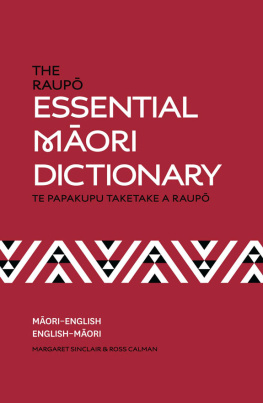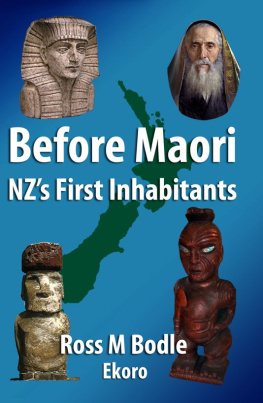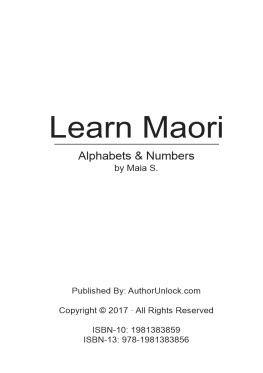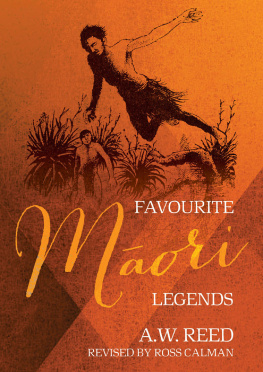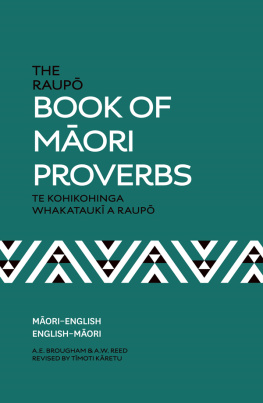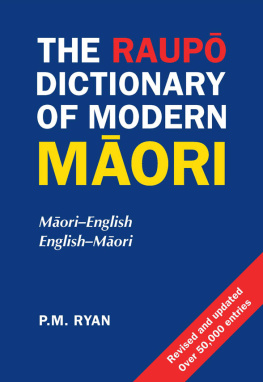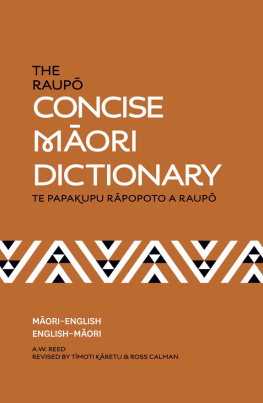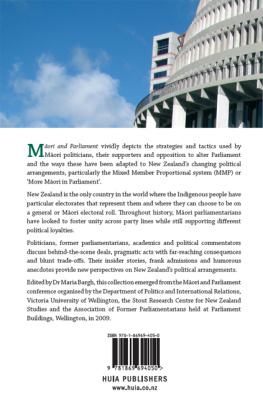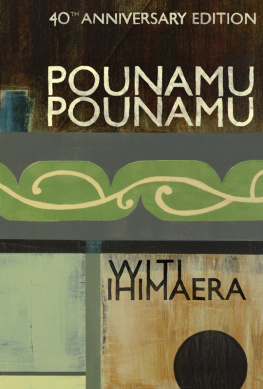He kupu whakataki Preface
Ruia taitea, kia t ko taikk anakeKeep only the heartwood. Tn koutou katoa. The aim of this dictionary is to provide a clear, concise guide to the Mori language for language learners at the basic and intermediate levels, as well as for those people who are interested in the meanings of Mori words. This dictionary is a refinement of the
Raup Concise Mori Dictionary, with all the words commonly used by Mori speakers retained and with many new words describing new technologies and subjects of topical interest added, including such words as ozone layer, nuclear-free and rollerblades. As Tmoti Kretu wrote in his introduction to the
Concise Dictionary, the Mori language contains no simple equivalent to some English words such as be, have, on, off and so on. This dictionary cannot record all the possible permutations; only those most commonly used are given here. The correct usage depends on the context, something the learner can only acquire through familiarity with the language.
Help should be sought in the more advanced Mori dictionaries that are available. Any dictionary editor is confronted with the question of regional variations. On the one hand, we did not want to bombard the student of Mori with numerous variant forms, but on the other hand, we did not want to prefer the form of one dialect over that of another. For this reason the most common variants are given and treated as separate words, eg, tehi and tahi, pwhiri and phiri, whea and hea all appear. Some transliterations have been omitted, where words based on original Mori root forms can replace them, for example hinu, originally meaning oil or fat is preferred for petrol over penehini, a transliteration of benzine. Te Taura Whiri i te Reo Mori/The Mori Language Commission has done a lot of work in this area, coining many new words based on older forms.
Many other transliterations, such as pukapuka for book are now accepted as standard Mori and, of course, are included. Unlike English, where the active form of the verb is preferred, the passive form is favoured by native speakers of Mori. Verbs with both active and passive forms have been included in the Mori-English section. Passive endings vary depending on the dialect only the most common are included here. Themed lists of words, such as days of the week, months of the year and so on, are included at the end of the book for convenience. The Mori language is particularly adaptable when it comes to parts of speech.
The same word can serve as verb, noun, adjective and adverb. For this reason parts of speech are only marked to avoid ambiguity of meaning. We would like to thank the teachers who gave up precious free time to look at our work and give us suggestions, Eric Niania and Tuteira Pohatu of the Auckland Education Advisory Service for their helpful comments, and Heni Jacob for her rigorous checking and invaluable suggestions for this dictionary. Noho ora mai koutou. Ross Calman and Margaret Sinclair October 1998
Pronunciation
The ten consonants in Mori: h, k, m, n, p, r, t, w, ng, wh. The first eight are pronounced as in English; ng is pronounced as the
ng in
singer;
wh as
wh in
whale, or as
f.
The five vowels: a, e, i, o, u. They are pronounced in two ways, short and long. Long vowels are indicated by a macron, eg, rai, in which the first a is long.
| Short | Long |
| a as u in but | as a in father |
| e as e in pen | as ai in pair |
| i as i in bit | as ee in feet |
| o as or in fort | as or in store |
| u as u in put | as oo in boot |
Where one vowel follows another their sounds are run together, e.g.,
ai (ah-ee) is sounded as
i in
high.
MORI-ENGLISH
A
, a and; of; until; when; of; at; time (future)
krua your (plural, addressed to two people)
koutou your (plural, addressed to three or more people)
mtou our (plural, theirs and mine)
mua our (plural, his or hers and mine)
rtou their (plural, three or more people)
rua their (plural, two people)
rohe local
ttou our (plural, three or more people)
tua our (plural, yours and mine)
e yes
aewa unhealthy
aha anything
ahakoa although
ahau I, me
hea? when? (future time)
hei able, possible
ahi fire
ahi k ownership through occupation
ahiahi afternoon, evening
Ahitereiria Australia
aho fishing line, string
ahu care for; heap; move or point in a certain direction
hua appearance, form, character; quite
hua mate unhealthy
hua ngkau mood
huaatua rude
ahuahu care for; heap
huareka pleasant; pleased
huatanga characteristics
ahunga direction
ahurei unique
huru comfortable
ahuwhenua crops, agriculture
ai according to; regularly, habitually
ai! oh!
ianei now, soon, today
aihe dolphin
aihikirmi ice cream
aikiha handkerchief
aikiha pepa tissue
io calm
aitanga descendants
aitu accident; bad omen; misfortune
aka vine
aka wina grapevine
kau rocky shore
ake very; own; self; upwards; onwards; more
ake, ake, ake for ever and ever
ki smash against
kina (pass) be smashed against
akiaki urge
kiri throw away
kiritia (pass) be thrown away
ako advise; learn; teach
kona (pass) be learned; be taught
konga student
akoranga learning; lesson
ku, aku my (plural)
kuanei soon
kuhata August
akut late
mai giddy
maimai nervous
Amerika America
mine amen
miomio turn round and round; be giddy
amiorangi satellite
amo carry; stretcher
amohia (pass) be carried
amorangi leader; priest
mua future, time to come
amuamu complain, grumble
amuri ake nei time to come; afterwards; later
na, ana her, his (plural); yes
an there
ana cave
anahera angel
anake only
nana! anan ! wow!
anei
